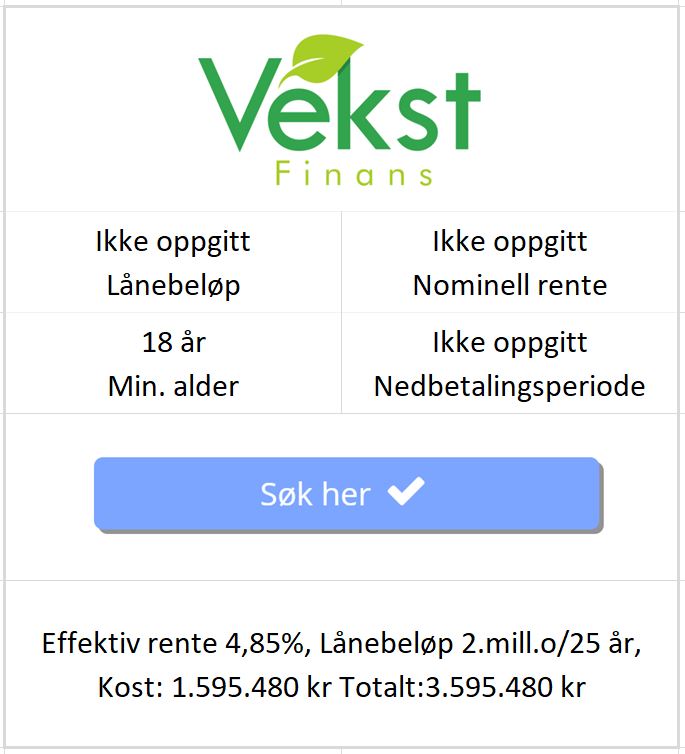New Facts On Picking Refinansiere Boliglån
Wiki Article
Consumer Loans Are Mainly Used For What?
Consumer loans have many uses according to the requirements of the individual and their financial situation. One of the main uses for consumer loans is debt consolidation. It involves the combining of multiple debts into one loan which makes payments easier and can lower the interest rate.
Home Improvements: Funding to fund improvements, renovations and repairs to a property or property.
Car Purchases- purchasing a new or used vehicle, either through auto loans or personal loans.
Education Costs - Tuition Fees and books, as well as other educational expenses.
Medical Expenses. The cost of paying medical bills and procedures.
Personal Expenses finance personal expenses such as weddings, travel or other significant expenses. Check out the top rated Søk Forbrukslån for blog examples including tf kredittkort, kalkulator boliglån, refinansiere kredittgjeld, boliglånskalkulator hvor mye kan jeg låne, uno finans, kalkulator lån, lån og renter, lånekalkulator forbrukslån, rente på lån, refinansiering av gjeld and more.

What Exactly Is A Mortgage Calculator And How Accurate And Efficient Is It?
Calculators for mortgages are financial tools that estimate mortgage payments by considering a variety of factors like the amount of the loan as well as interest rates, loan terms, and other costs, like insurance and property taxes. It lets homeowners estimate their home expenses and evaluate their affordability. Here are a few things to consider.
Estimation for Monthly Payments: Mortgage calculators provide an estimate of the monthly payment subject to the input data. In addition to principal and interest, some calculators also include homeowner's insurance, and private mortgage insurance.
Accuracy of Information- The accuracy or the calculator's results are dependent on the accuracy of input data. If the information provided about interest rates or loan amount or other information is incorrect or outdated the calculations may not be exact.
Limited Insights. Most mortgage calculators provide estimates. They don't cover all financial factors or consider fluctuations in variables, such as changes in rates of interest or the change in insurance and property taxes. costs.
Education Tool- These instruments are useful as educational tools which allow users to try various scenarios. Users can modify variables so they know how changes to loan terms or down payment affect monthly costs and overall costs.
Comparison Tool- Mortgage calculators let users compare various loan options, terms and down payment amounts. It aids you in making educated decisions regarding the different mortgage options.
Consultation with professionals- Although mortgage calculators can provide useful estimates, it's best to consult with mortgage brokers or financial advisors, lenders or financial planners for more information about the various loan options, eligibility criteria and your particular financial situation.
Mortgage calculators provide a quick method to look at various scenarios and estimate mortgage payments. Consulting with financial professionals is the best way to get precise and specific details, particularly regarding the approval of loans and rates. Have a look at the most popular Boliglånskalkulator for more recommendations including søk forbrukslån, forbrukslån rente, raske lån, låne rente, låne uten sikkerhet, nominell rente, rente forbrukslån, beregne boliglån, søknad om boliglån, din bank and more.
How Do You Calculate The Credit Score, And How Does It Factor Into The Approval Of Loans?
Credit scores can be calculated using a variety of variables. They also play a major element in credit approval. While different credit bureaus use slightly different algorithms, the following are the primary elements that affect the calculation of credit scores the most: Credit History (35%). The history of your payments is the most crucial aspect and reveals the likelihood of you making payments on past credit accounts. This section is affected by late payments or defaults.
Credit Utilization (30 30 percent) - This factor determines the amount of credit you're using in comparison to the total credit limit of all accounts. Lower ratios of credit utilization increase your credit score.
The duration of credit history (15 15 percent) is vital. Credit histories that are longer are an indicator of sound credit management.
Types Of Credit (10%) Affiliating your credit management by using a variety of credit, like installment loans, credit cards, and mortgages will positively affect your credit score.
New Credit Inquiries (10 percent) A number of new credit accounts in a relatively short time can affect your score. Every credit report that includes the hard inquiry could result in a small drop in your score.
The lender will consider credit scores when evaluating the creditworthiness of a potential borrower. A higher credit score signifies an enviable credit risk. Lower interest rates as well as an increased chance of loan approval, can result from getting favorable terms.
When you apply for a loan, lenders will consider your credit score along with other factors, such as income, job history, debt-to income ratio, as well as the purpose of the loan. For loan approval, lenders may have different specifications. A higher score can increase the likelihood of getting approved for a loan and also helps you to get better loan conditions.
Maintaining a good credit score demands an intelligent approach to managing credit that includes making timely payments, keeping credit utilization low, and managing the various types of credit carefully. It is also important to check your credit reports and rectify any mistakes. Read the recommended Refinansiere Boliglån for site advice including tf kredittkort, forbrukslån best rente, lån oppussing, lån med betalingsanmerkning uten sikkerhet, forbrukslån kalkulator, lav rente lån, låne uten sikkerhet, lånekalkulator boliglån, boliglån med betalingsanmerkning, tf kredittkort and more.

